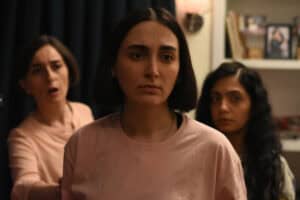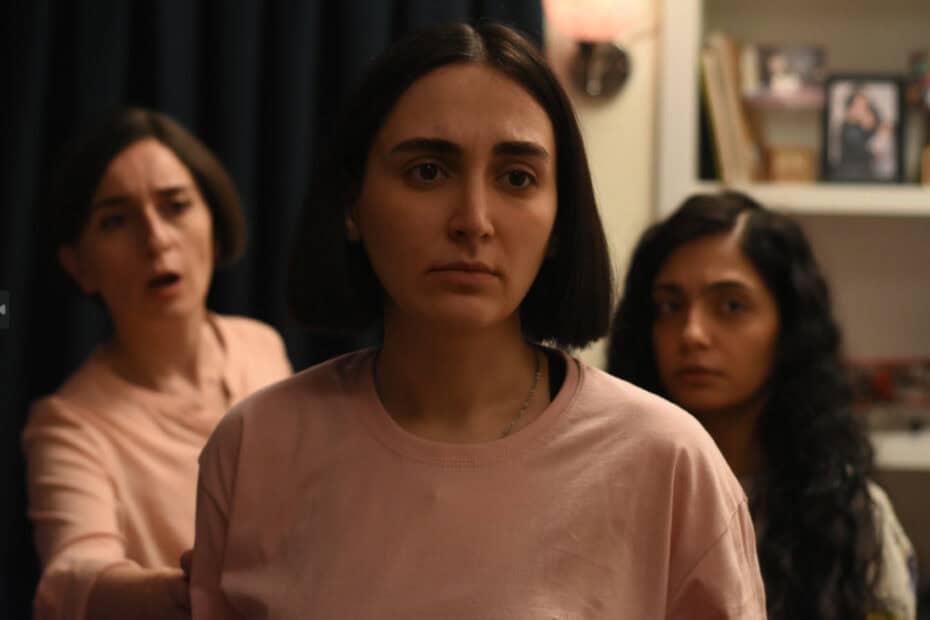The last day of the Cannes Film Festival has recently been a day for the least expected films of the festival. This year’s edition was decidedly different since Mohammad Rasoulof’s The Seed of the Sacred Fig was screened that day. The Iranian director has been famous for some time for political reasons rather than cinematic ones. Early works like Iron Island (Jazireh ahani 2005) were interesting, but his films have become increasingly didactic. A few days before Rasoulof won the Golden Bear in 2020 for There is No Evil
(Sheytan Vojood Nadara), a critic told me that this is a director who always tells the spectator what to think.
Considering works such as Manuscripts Don’t Burn (Dast-neveshtehaa nemisoosand) and A Man of Integrity (Lerd 2017), that statement might sound harsh but is far from unfair. The director’s problems with the Iranian regime are well-documented, and when it was announced that his latest film was selected for Cannes, the authorities reacted swiftly. On May 8, Rasoulof was sentenced to eight years in prison as well as flogging. The director managed to escape, and just by entering the Grand Théâtre Lumière, he was greeted as a hero. The film itself came with some buzz as well. Buyers and others who had seen it in advance were highly enthusiastic, and the Golden Palm was mentioned more than once.

The Seed of The Sacred Fig – Title Explained
I recall a well-known film critic and encyclopaedist who expressed grave annoyance when anything was the least ambiguous or not explained to his liking. He often mentioned two examples: the 1971 films Straw Dogs and A Clockwork Orange. In both cases, he lamented the fact that the meaning of the titles was not clear. If he were around today, he would feel at home in the current cinematic landscape. Whether you think that the film’s title is poetically enigmatic or feel that it sounds like yet another Ceylan work, the full explanation of its meaning is already present in the opening credits. There will not be much complexity or uncertainty during the remainder of the film either.
The plot revolves around a family whose father, Iman, has just been promoted to the post of investigating judge in the Revolutionary Court in Tehran. He quickly discovers that he will be little more than a pawn for the government, where he is supposed to follow the orders of his superiors, no matter how legally unsound those might be. Meanwhile, the protests against the regime are getting stronger, and Iman is given a gun for his family’s protection. His wife, Najmeh, is as government-friendly as him, but their two daughters are getting increasingly rebellious. One day, Iman notices that his gun is gone. How the mystery of the lost weapon is dragged out would make Chekhov roll his eyes.

The Seed of the Sacred Fig is 168 minutes long, and the longer the film goes on the more the duration is felt. There are strong moments in the film, not least the depiction of actual police violence captured on cell phones. It is clearly a film made for a non-Iranian audience, partly because of the “festival style” but also because it breaks the national rules, for instance, showing women’s hair uncovered. The rift between the family members is an obvious metaphor for the patriarchal rulers and the feminists. The conflict will escalate when the family leaves Tehran during the final act.
The awards jury decided to exclude the film from the regular prizes and awarded a Special Prize instead. On the other hand, Rasoulof’s film won both the FIPRESCI Prize and the Prize of the Ecumenical Jury. The Seed of the Sacred Fig will undoubtedly be screened at numerous festivals, regardless of its qualities. The jury should be commended for not giving out a major award to a work whose effect, if any, is purely political. If anyone would be interested in a more subtle film approaching the same topic, I recommend My Favourite Cake (Keyke mahboobe man) by Iranian-Swedish director Maryam Moghadam and Behtash Sanaeeha.
The Seed of the Sacred Fig

Director: Mohammad Rasolouf
Date Created: 2025-09-15 00:09
2
Pros
- An important topic
Cons
- Rife witch clichés
- Ludicrous genre play
